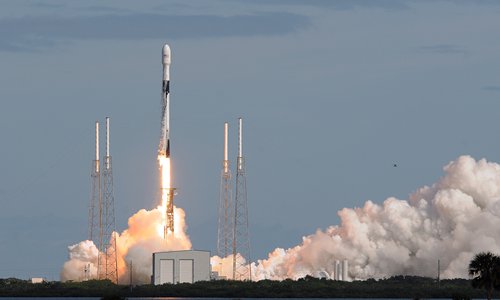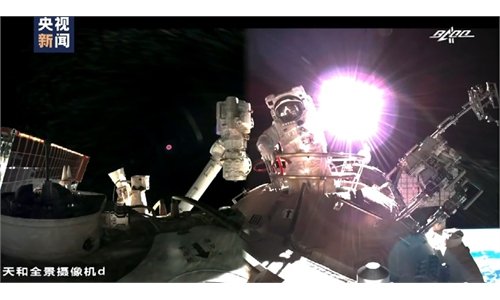US Starlink satellites irregular operations threaten not only safety of China’s space station ‘but also intl outer space environment’

A SpaceX Falcon 9 rocket lifts off from Cape Canaveral Air Force Station carrying 60 Starlink satellites in Cape Canaveral, Florida. Photo: VCG
Some foreign media said that China and Russia's activities in space that created "debris" will "bring more risks" when these outlets have tried to defend the improper maneuvering of SpaceX's satellites that encountered China's space station twice. In response, Chinese Foreign Ministry refuted the accusation, saying that such voices are trying to distract attention from the dangerous actions SpaceX had taken.
Chinese experts said that the SpaceX satellites which have close ties with the US military are not only threatening the safety of Chinese personnel in orbit, they could also be used for intelligence gathering against other countries' spacecrafts, and the frequent and massive operation of SpaceX satellites will pose security concerns for any spacecraft.
According to a note that the Permanent Mission of China to the United Nations (Vienna) addressed to the UN Secretary-General, during China's normal and legitimate space missions in 2021, Starlink satellites launched by SpaceX had two close encounters with the China Space Station separately on July 1 and October 21, such that it endangered the safety of Chinese taikonauts and forced China's Tiangong Space Station to "implement preventive collision avoidance control."
When reporting China's complaint against the US firm in the UN, US media including CNN said that "Russia and China have conducted anti-satellite, or ASAT, military tests that have essentially blown up satellites in orbit and created massive plumes of debris in space. That debris whips uncontrollably through orbit, threatening any spacecraft, space station or satellite that might cross the debris field's path."
Chinese Foreign Ministry spokesperson Zhao Lijian said at a routine press conference on Wednesday that the relevant voices from foreign media understate the fact that the safety of the China Space Station and the astronauts was under threat, hype up the so-called China space debris threat, and misrepresent China's normal space activities in an attempt to deflect international attention. "This is shifting the blame on the innocent by distorting concepts."
"China is committed to peaceful uses of outer space. Outer space is not a place beyond the reach of law. All countries should respect and uphold the international order in space based on international law, and adopt a responsible attitude to protect the safety of in-orbit astronauts and the safe and steady operation of space facilities. China is ready to maintain communication and cooperation with all countries over this."Zhao said.
Song Zhongping, a Chinese expert on the aerospace industry, told the Global Times on Wednesday that the Starlink plan initiated by Elon Musk in 2014 aims to build a satellite internet system to cover the entire planet with about 42,000 satellites.
"The massive and frequent operations of Starlink's satellites in space will surely bring huge threats or security concerns to others. And they will pollute the space environment, so it has already received complaints, accusations and criticisms from many astronomers and scientists worldwide," Song noted.
This is not the first time that Starlink satellites have posed a threat to other countries' spacecraft, as two years ago, the European Space Agency (ESA) had a similar experience.
According to space.com, a professional website on space and astronomy news, a European Earth-observation satellite performed an evasive maneuver on September 2, 2019 to make sure it did not collide with one of SpaceX's recently launched internet craft.
"The ESA's Aeolus satellite fired its thrusters yesterday morning, raising its orbit to pass safely over that of "Starlink 44," one of the first 60 satellites in SpaceX's envisioned internet megaconstellation," read an article on the website .
What makes the world more concerned is that the US military is testing the Starlink system to serve the military purposes, said analysts. They noted that the US military could also use the Starlink satellites to conduct spy missions. In order to protect its own spacecraft and personnel in orbit, China needs to firmly oppose the militarization of space, and improve its capability to defend its spacecraft, experts urged.
For China's Tiangong space station to take evasive maneuvers, it might need to use the propulsion systems on the Tianzhou or Shenzhou spacecraft that are now docked on the space station, or even the space station's own propulsion system. Either way, this would consume fuel and bring about additional costs, Song said.
This will not bring such a big negative effect to the space station, though, since the spacecraft will eventually leave the space station, Song said. But the biggest threat the US satellite brought about is the risk of collision, and the threats to the lives and safety of the space station crew.
Chinese analysts also warned that Musk's company needs to handle the case seriously, as the Chinese public has expressed anger on the matter on social media platforms, and Chinese consumers might decide to boycott Musk's business in China's market, such as the Tesla vehicles.



